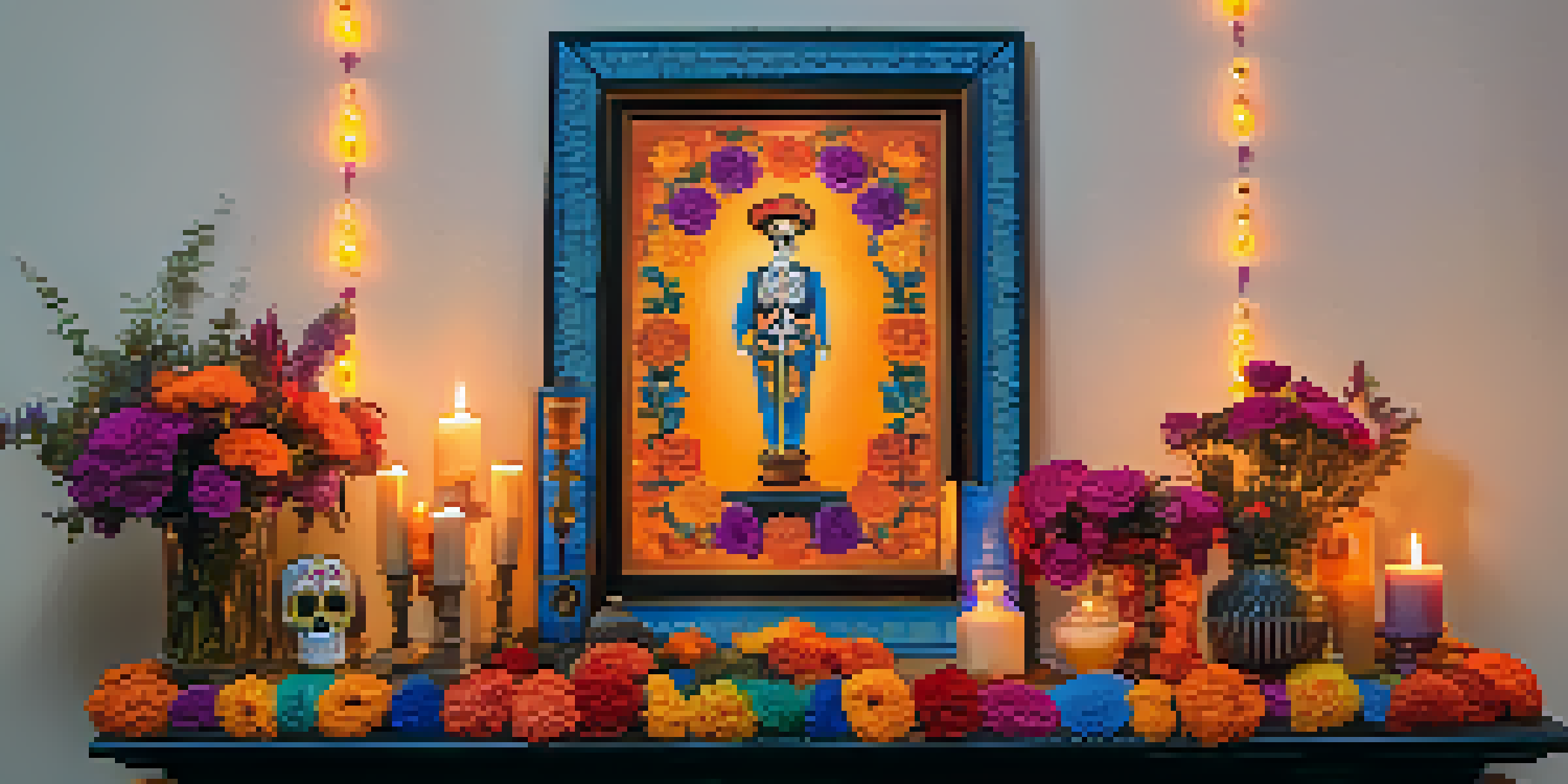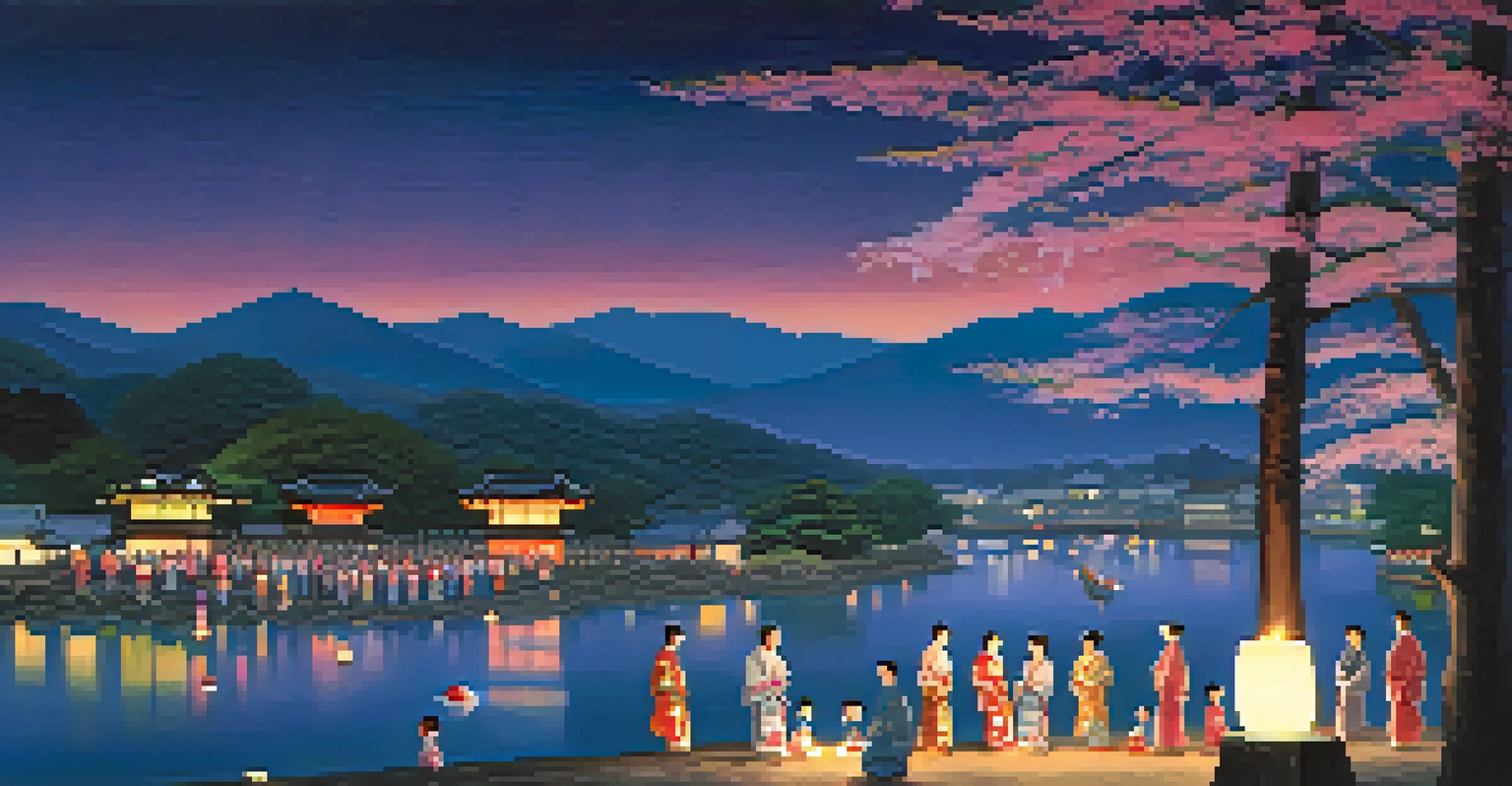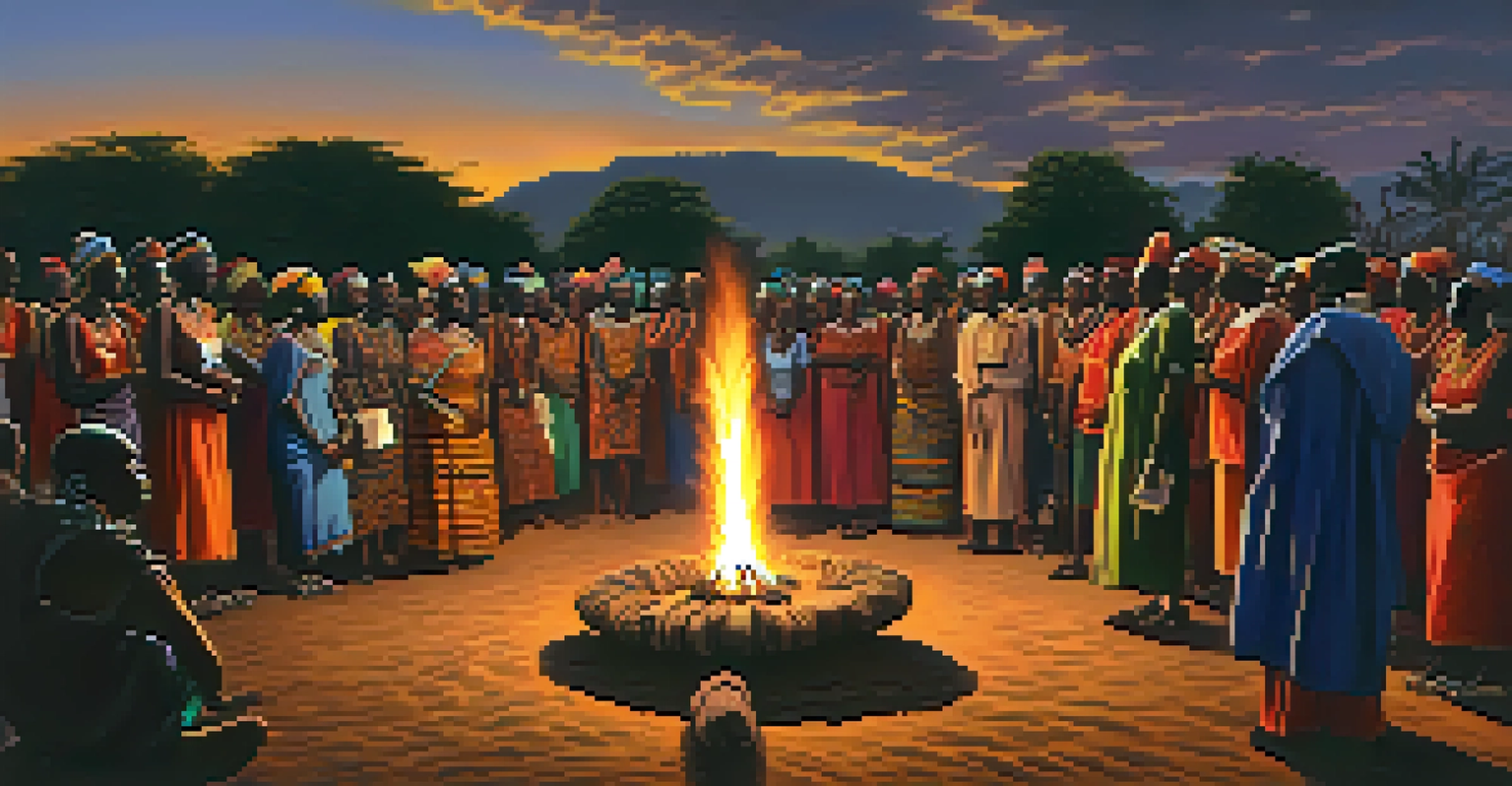Rituals of Remembrance: Honoring the Departed in Cultures

The Importance of Remembering Our Loved Ones
Remembering those we’ve lost is a deeply human experience that transcends cultures. It helps us process grief and celebrate the life of the departed. Many people find comfort in rituals that give meaning to their loss, creating a connection that persists even after death.
To live in hearts we leave behind is not to die.
Rituals serve as a way to express our emotions and maintain relationships, even in the absence of physical presence. They can be as simple as lighting a candle or as elaborate as a full ceremony. These practices often provide a sense of closure, allowing us to say goodbye while honoring the memory of our loved ones.
In essence, remembrance rituals are a way to keep the spirit of those we've lost alive in our hearts and minds. They remind us of the impact these individuals had on our lives, helping us to carry their legacy forward.
Dia de los Muertos: A Vibrant Celebration of Life
In Mexico, Dia de los Muertos, or the Day of the Dead, is a colorful celebration that honors deceased loved ones. Families create altars adorned with photos, favorite foods, and flowers to welcome the spirits back for a day. This festival is not about mourning; rather, it embraces the cycle of life and death.

The marigold flower, known as cempasuchil, plays a significant role in this celebration. Its vibrant color and scent are believed to guide spirits back to their earthly homes. With parades, music, and dancing, the festival showcases joy and remembrance in a uniquely heartfelt way.
Rituals Help Us Remember Loved Ones
Engaging in remembrance rituals allows us to process grief and celebrate the lives of those we've lost.
This ritual highlights the cultural belief that death is not an end but a continuation of existence. By celebrating their lives, families ensure that the memories of their loved ones remain alive in the community.
Obon: Honoring Ancestors in Japanese Culture
In Japan, Obon is a Buddhist festival dedicated to honoring the spirits of ancestors. Traditionally held in mid-August, families return to their hometowns to pay respects at family graves. This time is marked by various customs that reflect deep respect for the departed.
Death is nature's way of telling you to slow down.
One of the most iconic aspects of Obon is the Bon Odori dance, performed to welcome the spirits of ancestors back to the world of the living. Lanterns are often lit and released into rivers or the sky, symbolizing the guiding of spirits back to their resting places. This blend of celebration and reflection is a beautiful tribute to familial bonds.
Through these customs, participants connect with their roots, fostering a sense of belonging and continuity. It reinforces the idea that the influence of ancestors remains alive within the family.
Hindu Rituals: Ancestral Worship and the Journey Beyond
In Hinduism, death is seen as a transition rather than an end, and rituals surrounding this event are deeply significant. The shraddha ceremony is performed to honor deceased ancestors, where offerings of food and prayers are made to ensure their peace in the afterlife. This act of remembrance reflects the belief in the interconnectedness of life and death.
Families often gather to perform these rituals during specific lunar phases, signifying their ongoing connection to those who have passed. The use of sacred items such as water and rice symbolizes nourishment and respect, reinforcing the bond between the living and the departed.
Cultural Celebrations of Remembrance
Various cultures, like Dia de los Muertos and Obon, showcase unique traditions that honor the deceased while reinforcing community bonds.
These practices underscore the importance of lineage and heritage in Hindu culture. By honoring ancestors, families not only seek blessings but also keep the memory of their loved ones alive across generations.
African Traditions: Celebrating Life Through Ancestor Veneration
Many African cultures place a strong emphasis on ancestor veneration, believing that the spirits of the deceased continue to influence the living. Rituals vary widely across the continent, yet they all share a common goal: honoring the legacy of those who came before. Ceremonies may include singing, dancing, and communal feasting, celebrating the lives of ancestors.
One notable practice is the “Day of the Dead” in Ghana, where families gather to honor their deceased relatives. They prepare special dishes, share stories, and sometimes even set up altars with photos and possessions of the departed. This gathering reinforces community ties and ensures that the memories of ancestors remain vibrant.
These traditions remind us that death is not something to be feared, but an integral part of the life cycle. By celebrating ancestors, families strengthen their bonds and acknowledge the wisdom and guidance passed down through generations.
Day of the Dead in Other Cultures: A Shared Experience
While Dia de los Muertos is most famously celebrated in Mexico, similar traditions exist in various cultures around the world. For instance, in Guatemala, families honor their deceased with colorful kites and elaborate altars. These practices highlight the universal desire to remember and celebrate loved ones who have passed.
In the Philippines, All Souls' Day is marked by families visiting cemeteries to clean graves and offer prayers. This ritual is a way of showing love and respect, ensuring that those who have passed are not forgotten. Such acts are often accompanied by feasting, as families gather to share stories and memories.
Memory Connects Past and Present
Memory plays a crucial role in remembrance rituals, preserving the legacies of our loved ones and fostering a sense of belonging.
These shared experiences demonstrate that while customs may differ, the core sentiment remains the same: a deep-rooted desire to honor and remember those who have enriched our lives. It’s a reminder that love knows no boundaries, transcending time and space.
The Role of Memory in Rituals of Remembrance
Memory plays a crucial role in rituals of remembrance, acting as a bridge connecting the past with the present. When we engage in these rituals, we actively participate in a collective memory that honors the experiences and legacies of those we've lost. This practice not only preserves their stories but also reinforces our shared humanity.
Through storytelling, music, and art, memories are kept alive and passed down through generations. They serve as reminders of the values and lessons imparted by those who came before us. Engaging with these memories allows us to celebrate the richness of life and the impact of our loved ones.

Ultimately, rituals of remembrance foster a sense of belonging and continuity, helping us navigate our grief while celebrating the lives of those we cherish. By honoring their memory, we keep their spirit alive in our hearts.
Conclusion: The Universal Need to Remember
Across cultures, the rituals of remembrance serve a vital purpose: they help us cope with loss while celebrating the lives of those we’ve lost. Whether through vibrant festivals, solemn ceremonies, or simple acts of remembrance, these rituals reflect our universal need to honor the departed. They remind us that while death is a part of life, the impact of those we’ve loved remains with us.
By participating in these rituals, we not only connect with our own heritage but also with the broader human experience. They provide comfort and community, reinforcing the idea that we are not alone in our grief. In many ways, these rituals weave a tapestry of shared experiences that highlight our collective journey through life and death.
In conclusion, honoring those who have passed is a beautiful testament to love, memory, and the enduring human spirit. As we engage in these practices, we celebrate life itself, ensuring that the stories of our loved ones continue to resonate in our hearts and communities.